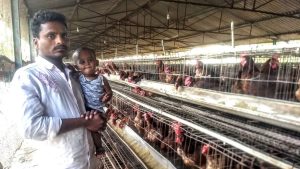People of Bharat: Samil Pasha, Hyderabad

‘Kya kaam hai Ji? Bolo!’(What do you want?) I see a man walking restlessly towards me. He wants to know why am I standing so close to the compound gate. He is Samil Pasha, the care-taker of a poultry farm. When he ascertains I am no trespasser, he invites me in. And suddenly we are in the layer-room; a long hall, with layers and layers of hens in cages. He guides me towards a huge array of small cages cooped to form three stepped layers containing three hens in each cage. ‘I am in charge of this place!’ he candidly announces. Huge and long, Devi poultry farm is well lit during the day with the compound wall built at a short distance from the shed. We walk towards the tiny house close to the compound wall and sit outside.
Samil Pasha is a short man with a lean body. He continues to speak, ‘I am 28 years old and a native of Pasnoor village in Kondamallepally district in the state of Telangana.’ He now lives in Yadadri district with his wife Nausheen and two daughters, aged one and four. As we speak, his wife and daughters, Sabah and Aafroz join us, staring at their new visitor with amusement.
Samil hails from a family of tailors. He learned the art from his grandfather but chose to drive an auto-rickshaw for a living. He pooled in his family savings and bought an auto-rickshaw for Rs. 1 lakh 30 thousand about five years ago. He had made the payment entirely in cash. Samil ran into losses and was at home unemployed for almost a year. His parents got him married against his will and soon started working as a tailor in the family shop. He worked for few years but soon realised the earnings from that business were not enough to sustain his growing family. His wife’s family found him this job of an overseer at a poultry farm in Yadadri through some contacts they had. He moved out with his wife and two daughters in 2015.
At the farm, Samil is paid a monthly salary of Rs. 12,000 for looking after the poultry farm operations. His wife is paid Rs. 7,000 and she helps him with various tasks. The family spends Rs. 7,000 on groceries, and the rest is saved in a company-operated account. Samil and his wife do not have a bank account in their names. Their home is a small room with a fan and a TV. They do not have a gas connection and use an electric cooker to cook their meals — consisting mainly of rice no meats or veggies. They do not have toilet in the home. Samil owns a motorcycle and a smartphone which he uses for calls and messages from company. He tells me that he owns the house in his native village. It has 8 rooms but the house is locked. ‘There are no opportunities in that place to earn a livelihood,’ he remarks.
As we speak, Samil pauses to pick up his younger daughter who is sobbing uncontrollably. His wife has gone out to check on something. He carries her and starts telling me about his typical work day. His day starts at 6 AM as he checks every hen for the eggs laid by them. ‘Do you have to work on a Sunday?’ I ask. ‘There is no Sunday for me. The hens don’t know what day (of the week) it is!’ he chuckles. He tells me the poultry farm has 18,000 hens with a monthly output of 16,000 eggs. Samil has 20 laborers who work under him; 15 of these are women. The laborers collect the eggs, clean them and pack them; they also contribute in cleaning chores and maintenance work. Samil’s day typically ends at 8 PM. He explains me how each hen is highly fertile for a period of nearly one and a half year. Infertile hens are then sold in local markets of Telangana, Maharashtra, and Gujarat for meat.
His younger daughter grows restless. Samil tries to comfort and then we hear that welcome sound of a bell. It’s the local ice-cream vendor on his cart making his daily round on the street. He hands a Rs. 10 note to his elder daughter. She returns in a jiffy with an ice-cream and hands it to her sister. The elder daughter takes a turn at engaging the toddler now; allowing her to jump on to her back. The children laugh and giggle with each other. Samil turns his attention to my questions and is soon joined in by his wife.
When I ask about his future plans, he says that he plans to continue working at the poultry farm for the next five years. “Siraf tailoring aur poultry Ji, aur kya karenge ham?” (Only tailoring and poultry work, what else can I do?) He wants to save enough and return to his native village. ‘I cannot raise my daughters in the Yadadri. I want to, but it’s too expensive,’ he says. His wife tells me they are paying Rs. 1000 towards school fees for the elder daughter who has just started school. Half of this amount is paid by the poultry farm owner. Samil and his wife have managed to save Rs. 3 lakhs in the company’s account. They own about one acre of agricultural land in the village and his wife has some gold which is in her mother’s safe-keeping.
Samil feels his finances are gradually improving. He gets an annual raise of Rs. 1200 every year and gets his salary on time. When he moves back to his village, he wishes to restart his tailoring business. He dreams to educate both his daughters. He doesn’t want Nausheen to work and so wishes for a financial condition which would allow her to focus all her attention on raising their daughters. I realise that the smell from the barn is still as overpowering as it was in the morning. The sun is disappearing below the horizon, when we hear a truck honk getting Samil on his feet. It’s time for him to pack up the orders for delivery. I am left behind with his parting words as he leaves: “Hamari bachhiyo ke liye he kaam karna mai, unko dekha to sab theek hojata. Ek din khud ki company chalayngi” (I will work hard for our daughters; when I look at them, all my troubles disappear. One day they will (grow up) and run their own company.)
This research was developed as part of the Bharat Inclusion Initiative.
